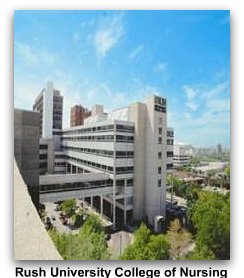
Last updated in 2022
Rush University Nurse Anesthesia Program
College of Nursing
600 S. Paulina St.,
Armour Academic Center, #1034
Chicago, IL 60612
Contact Information
Michael J Kremer, Ph.D., CRNA, CHSE, FNAP, FAAN, Program Director
ph: (312) 942-6125
fax: (312) 942-8157
email: Mike_J_Kremer@rush.edu
Maiko Yamashita, DNP, CRNA
Acting Director, Nurse Anesthesia Program
email: maiko_yamashita@rush.edu
Admission Specialist
Elizabeth Miranda
email: elizabeth_m_miranda@rush.edu
Quick Facts
CRNA Degree offered
Doctor of Nursing Practice (DNP)
Program Length
36 months, full time
Credit Hours
89 credit hours
Starting Month
September
Application Deadline
May 2
Apply through Nursing’s Centralized Application Service (NursingCAS)
Entire Cost of CRNA School for Rush University Nurse Anesthesia Program.
Tuition is calculated at the 2021-2022 rate. Tuition at most schools increases each academic year. Over the duration of the program, expect to pay a tuition that is 5% to 15% higher than what is shown here.
Cost of Tuition: $108,936
Fees and expenses:1,650
Grand Total: $110,586
Class Size
22-24 students
CRNA Program Summary
Are you concerned that Rush University College of Nursing won’t give you the specific experiences or training you need to be a successful CRNA? Learn what standards CRNA Programs must meet in order to be accredited by the Council on Accreditation of Nurse Anesthesia (COA).
Rush University College of Nursing (as well as all others that are accredited by the COA) prepares you to take the CCNA certification exam at the conclusion of the program, allowing you to become a CRNA.
You’ll learn to provide anesthesia for every type of surgical patient including thoracic, cardiovascular, neurological, transplant, trauma, obstetrics, and others. The time commitment throughout the program is extensive.
Program Requirements
Looking for something specific? Find CRNA schools categorized by their unique requirements.
Some CRNA schools require much more out of their applicants than others. See how the requirements at Rush University compare to most CRNA school’s requirements.
CRNA Program Requirements
Degree Requirement
A minimum of a Bachelor of Science in Nursing from an accredited institution is required.
No undergraduate prerequisite courses are required to apply.
RN:
Registered nurse licensure in the United States.
Critical Care:
Need at least one year, preferably two, of recent ICU (Adult ICU preferred) experience as a Registered Nurse (RN).
Acceptable critical care experience includes any experience in an ICU or Cardiac Care Unit.
They do NOT accept:
- Recovery Room
- Emergency Department
- Telemetry
- Step-Down
- Invasive Radiology
- Operating Room
- Cath Lab
GPA:
GPAs of 3.0 or higher (on a 4.0 scale) however the average Cumulative GPA for admitted students is 3.57
and for Science, GPA for admitted students is 3.28
Science Courses included in Science GPA calculation – all undergraduate or graduate:
- Biology
- Microbiology
- Chemistry
- Anatomy
- Physiology
- Pathophysiology
- Physics
- Pharmacology
- Immunology
GRE:
Not required
TOEFL:
Minimum score of 550/79/213 in Test of English as a Foreign Language (TOEFL) is mandatory for non-native English speakers.
You may request to waive:
If you have completed baccalaureate degree or a minimum of three years of higher education in the United States.
Certifications must be completed before the application deadline:
- BLS (Basic Life Support)
- ACLS (Advanced Cardiac Life Support)
- PALS (Pediatric Advanced Life Support)
- CCRN (highly recommended)
Rush University Nurse Anesthesia Program
CRNA School Performance
Accredited CRNA Programs are reviewed regularly.
Rush University College of Nursing Anesthesia Program was last reviewed 05/2015. It was given the maximum of 10 years accreditation and will be reviewed again 05/2025. This shows that the program is very stable.
Pass Rate for CRNA Boards at Rush University
First-time test takers: 100% (Class of 2020)
Attrition Rate: 0% (Class of 2021)
Employment Rate within six months: 100%
CRNA Salaries
An average nurse anesthetist salary in Illinois.
Illinois CRNA salaries are higher than the U.S. average, with an annual mean wage of $199,660.
An average annual nurse anesthetist salary in the US is $181,040 (according to the Bureau of Labor Statistics 2019 study)
Did you find an error on this page? Please report it here